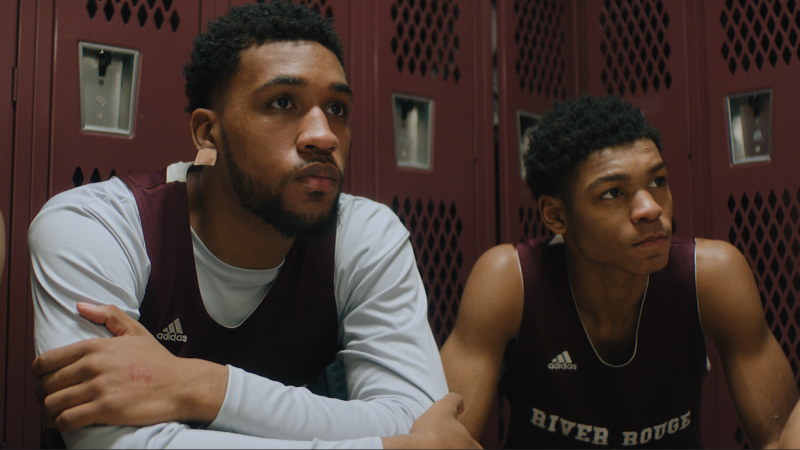In his director’s statement, Hamoody Jaafar says that real people, real places and real stories are the inspiration for his work. His basketball documentary, Rouge is an engaging story about the River Rouge High School Panthers – past and present.
Between 1954-72, the Panthers won a record 12 state championships under their legendary coach Lofton Greene. Now, former Panther player LaMonta Stone, returns to the once thriving industrial town of River Rouge, Michigan, seeking the school’s fifteenth state championship as its head coach. Rouge is as much about the personal journeys of its subjects, among them Seniors Brent Darby Jr. and Ahmoni Weston, and junior Legend Geeter, as it is about basketball and the dreams of its players who look ahead to their collegial future.
Steve James’s Hoop Dreams (1994), about the struggles of two inner-city Chicago high school teenage basketball players with aspirations of playing professional, and Jason Hehir’s The Last Dance (2020), chronicling Michael Jordan and the Chicago Bull’s 1997-1998 season campaign to win a sixth NBA title, are perhaps the two seminal basketball documentaries. Jaafar’s film struggles to escape these long shadows, but as if it were doggedly moving back and forth between offence and defence on the court, it captures something of Hoop Dreams and The Last Dance. There are the struggles the adolescent players must confront as student-athletes, and the pursuit to add to a legacy, that echoes both James and Hehir’s captivating real-life stories.
Jaafar’s directorial debut shows his deft touch at constructing layers of a story. He does this by identifying chapters in the story of the basketball programme, drawing out themes and ideas that contribute to a broader conversation. The first is emphasising the relationship between past and present, and the new generation of players that want to belong to the school’s storied history. It speaks to the natural desire in each of us to belong to something, which provides us with a sense of meaning and purpose. Only for these players, everything has to be earned. They must confront their vulnerabilities and the uncertainty of the future, even the outcome of each game they play on route to hopefully being one of the final two teams playing for a state championship.

The Michigan State Spartans University head basketball coach Tom Izzo offers some of the films most compelling contributions. He speaks about how sport at its best can break down boundaries and acknowledges Lofton Greene’s determined principle of setting aside racial politics in the segregated US to give those deserving the opportunity. Greene would select an all-five starting line-up of black players and would go on the record as saying he didn’t care about the colour of his players’ skin. Shining a light on these progressive actions during segregation and remembering someone that was ahead of their time sets Rouge aside as an important and necessary film.
Memory is a subject that Jaafar weaves throughout the film. Former players gather in the run-down gymnasium and its locker room, reminiscing about the past. The bonds of sweat spilled on the court transcend the years, as the audience witnesses the timeless connection these players share with one another. It calls to mind how the past never fades into obscurity as long as it’s alive in the memory. What Stone and his players, among them Darby Jr., Weston, and Geeter are trying to do is to keep the past alive and create new memories so that the River Rouge legacy endures for future generations.
One of the striking things about Rouge is how Jaafar immerses you in the real-life drama of Stone’s campaign to win the fifteenth state championship. He splices through time, creating music montages, picking out the on-court action and off-court conversations the audience need to see and hear. In the on-court action, one forgets they are watching a documentary and momentarily finds themselves perched on the edge of their seat in front of a live sporting event. Rouge effortlessly captures how the individual journeys intersect one another, emphasising that what’s special about team sports is that aside from the individual accolades, it’s the camaraderie of pursuing a common goal.
Rouge premieres at the Cleveland International Film Festival. It also shows at the Freep Film Festival.








